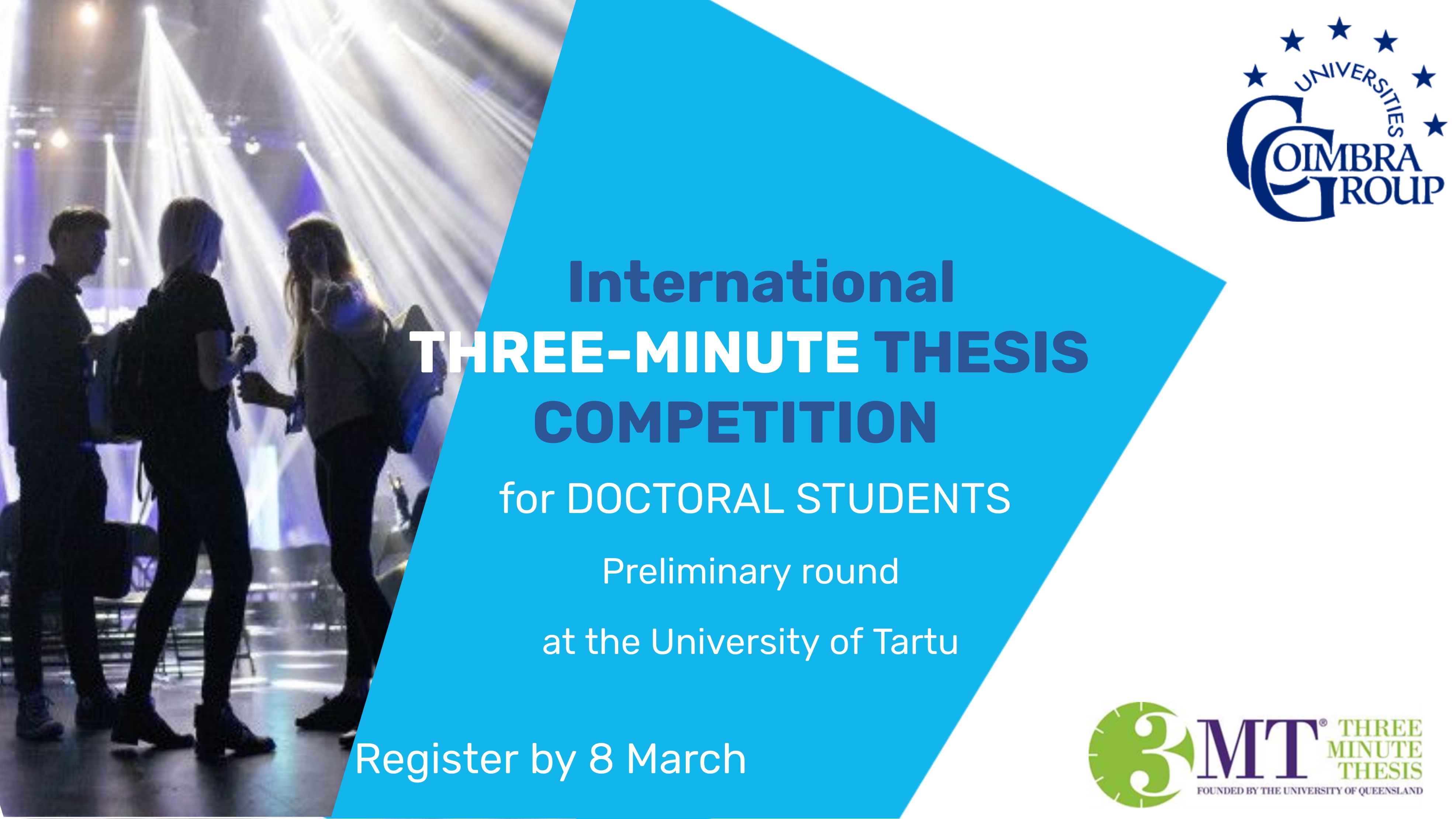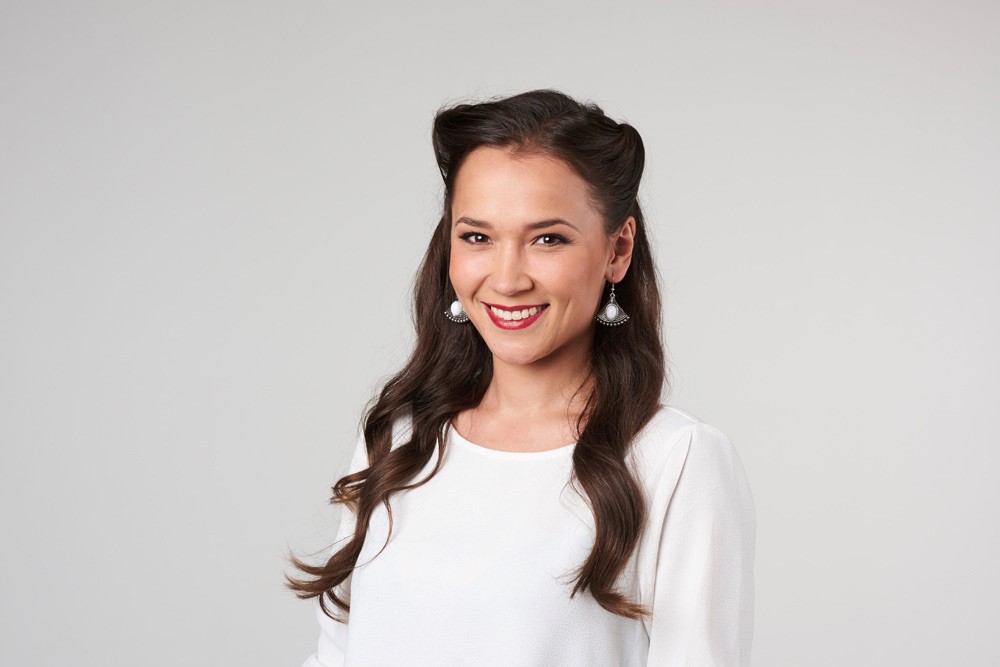Doctor Sudy
Past events
Coimbra Group Three-Minute Thesis Competition
Preliminary round at the University of Tartu
 On 19 March, the preliminary round for the international Coimbra Group 3-Minute Thesis Competition is held at the University of Tartu. We invite doctoral students to participate and introduce their research in the form of a captivating three-minute presentation in English. A video recording of the winner’s presentation will be sent to represent the UT in the international competition. Register here (open until 08.03.2021).
On 19 March, the preliminary round for the international Coimbra Group 3-Minute Thesis Competition is held at the University of Tartu. We invite doctoral students to participate and introduce their research in the form of a captivating three-minute presentation in English. A video recording of the winner’s presentation will be sent to represent the UT in the international competition. Register here (open until 08.03.2021).
Preparation
To participate in the competition, prepare a captivating three-minute presentation summarising the problem that is driving your research, the ways to solve it, and its importance and impact.
Participation
Make your presentation in front of the UT competition jury on 19 March. A video recording is made of the presentation.
Evaluation
From the presentations made on 19 March, the three best are selected. The authors of these presentations will receive a cash prize. The video recording of the winning presentation will be sent, as the UT representative, to the Coimbra Group’s international Three-Minute Thesis competition.
Communication
We do our best to communicate the topics presented at the UT competition both via the university channels and in the press – so the exciting science stories can also be heard outside the university.
19 March– preliminary round at the UT
31 March – UT submits its representative’s video to the international competition
1–7 April – organisers of the international competition check the eligibility of received recordings
8–22 April – international judging panel selects the top three recordings
16–18 June – hosted by Charles University in Prague, details will be clarifield later
- A single static PowerPoint slide is permitted. No slide transitions, animations or ‘movement’ of any description are allowed. The slide is to be presented from the beginning of the oration.
- No additional electronic media (e.g. sound and video files) are permitted.
- No additional props (e.g. costumes, musical instruments, laboratory equipment) are permitted.
- Presentations are limited to 3 minutes maximum and competitors exceeding 3 minutes are disqualified.
- Presentations are to be spoken word (e.g. no poems, raps or songs).
- Presentations are to commence from the stage.
- Presentations are considered to have commenced when a presenter starts their presentation through either movement or speech.
- The decision of the adjudicating panel is final.
Comprehension and content
- Did the presentation provide an understanding of the background and significance to the research question being addressed, while explaining terminology and avoiding jargon?
- Did the presentation clearly describe the impact and/or results of the research, including conclusions and outcomes?
- Did the presentation follow a clear and logical sequence?
- Was the thesis topic, research significance, results/impact and outcomes communicated in language appropriate to a non-specialist audience?
- Did the presenter spend adequate time on each element of their presentation – or did they elaborate for too long on one aspect or was the presentation rushed?
Engagement and communication
- Did the oration make the audience want to know more?
- Was the presenter careful not to trivialise or generalise their research?
- Did the presenter convey enthusiasm for their research?
- Did the presenter capture and maintain their audience’s attention?
- Did the speaker have sufficient stage presence, eye contact and vocal range; maintain a steady pace, and have a confident stance?
- Did the PowerPoint slide enhance the presentation – was it clear, legible, and concise?
- In three minutes, an average narrator is able to utter about 370–380 words. This is approximately 3,000 characters and fits on one A4 page.
- It is recommended that you prepare the presentation carefully, and practice it repeatedly in front of the mirror.
- Avoid using foreign words or specific terms because, according to Albert Einstein, “If you can’t explain it to a six-year-old, you probably don’t understand it yourself”.
Write for your audience
- Avoid jargon and academic language.
- Explain concepts and people important to your research – you may know all about the field but your audience may not.
- Highlight the outcomes of your research, and the desired outcome.
- Imagine that you are explaining your research to a close friend or fellow student from another field.
- Convey your excitement and enthusiasm for your subject.
Tell a story
- You may like to present your 3MT as a narrative, with a beginning, middle and end.
- It’s not easy to condense your research into three minutes, so you may find it easier to break your presentation down into smaller sections.
- Try writing an opener to catch the attention of the audience, then highlight your different points, and finally have a summary to restate the importance of your work.
Have a clear outcome in mind
- Know what you want your audience to take away from your presentation.
- Try to leave the audience with an understanding of what you’re doing, why it is important, and what you hope to achieve.
Revise
- Proof your 3MT presentation by reading it aloud, to yourself and to an audience of friends and family.
- Ask for feedback.
- Ask your audience if your presentation clearly highlights what your research is about and why it is important.
Please see also Jason Mario Dydynski presentation at Coimbra Group Annual Conference.
More information:
Piret Ehrenpreis, UT Research Communication Adviser, 58160090, piret.ehrenpreis@ut.ee
Merili Hansen, UT GSCSA, GSLPS gradaute schools Project Manager of Events, merili.hansen@ut.ee
The event is supported by the European Regional Development Fund (University of Tartu ASTRA Project PER ASPERA).
Time Management Training
Doctoral Schools at University of Tartu in cooperation with Aeternum Training and Consulting
At the facilities of UT or via Zoom
This training series on Time Management is intended for doctoral students and advisors. This practical training seminar in time management offers tips and recipes for increasing motivation and the effective planning of tasks and processes of various importance. Participants will gain useful insights that are immediately applied into practice through individual and group exercises.
The trainings will be delivered by Aeternum trainer-consultants Maria Johnson (in English) and Kati Tikenberg (in Estonian).
 Maria Johnson has been training and educating adults in the business world since 2017. Having worked as an interpreter for various trainings and programs in the field of Psychology, she discovered her passion and calling for educating and inspiring people to live their lives more effortlessly. Maria has studied with teachers from all over the world and completed more than 2000 hours of training. She is currently completing her degree in Psychology at University of Tartu. Find out more here.
Maria Johnson has been training and educating adults in the business world since 2017. Having worked as an interpreter for various trainings and programs in the field of Psychology, she discovered her passion and calling for educating and inspiring people to live their lives more effortlessly. Maria has studied with teachers from all over the world and completed more than 2000 hours of training. She is currently completing her degree in Psychology at University of Tartu. Find out more here.
- The participant knows how to analyze their time management skills and identify areas for improvement;
- The participant knows how to create an effective and realistic plan for their time;
- The participant knows various methods for time chunking and prioritization;
- The participant knows how to deal with time-wasters;
- The participant knows how to increase personal motivation and deal with procrastination;
- The participant is motivated to hone and apply a personal set of methods and tools for effective time management.
9:45-10:00 Arrival and coffee
10:00-11:30 Introductions; Values and time
11:30-11:45 Break
11:45-13:15 Establishing priorities; meta-programs
13:15-13:45 Lunch
13:45-15:15 Principles of planning your time
15:15-15:30 Break
15:30-17:00 Tool-box of methods; conclusions and summary
Food and beverages will be provided for the participants at the training venue.
| Date of training | Target Audience | Location | Registration |
| December 15, 2020 | Doctoral Students (EST) | Online via ZOOM | Closed |
| December 18, 2020 | Supervisor (EST) | Online via ZOOM | Closed |
| March 4, 2021 | Supervisor (EST) | Online via ZOOM | Closed |
| March 11, 2021 | Doctoral Students (EST) | Online via ZOOM | Closed |
| March 24, 2021 | Doctoral Students (ENG) | Online via ZOOM | Closed |
| April 7, 2021 | Doctoral Students (EST) |
Registration opens about a month before the training.
Registration is open until the places are full. Accepted participants will be sent an e-mail about 2 weeks before the training with an participation confirmation and training information. Also for those, whom we cannot offer a place this time and thows who are aaded to the waiting list will be sent information. If you have been accepted but cannot take part in the training, please let us know immediately so that we can transfer the place to the next one in the waiting list.
Participation is limited to 20 spots.
All participants are required to map their personal time-use before the training for 7 days in 15-minute increments. The data collected will be used throughout the training as a tool for reflection and exercises. Precise instructions and forms will be sent to the participants two weeks prior to the training.
Contact:
Merili Hansen, merili.hansen@ut.ee, 737 6535
Maria Johnson, maria@aeternum.ee 58 367 717
The event is supported by the European Regional Development Fund (University of Tartu ASTRA Project PER ASPERA).


